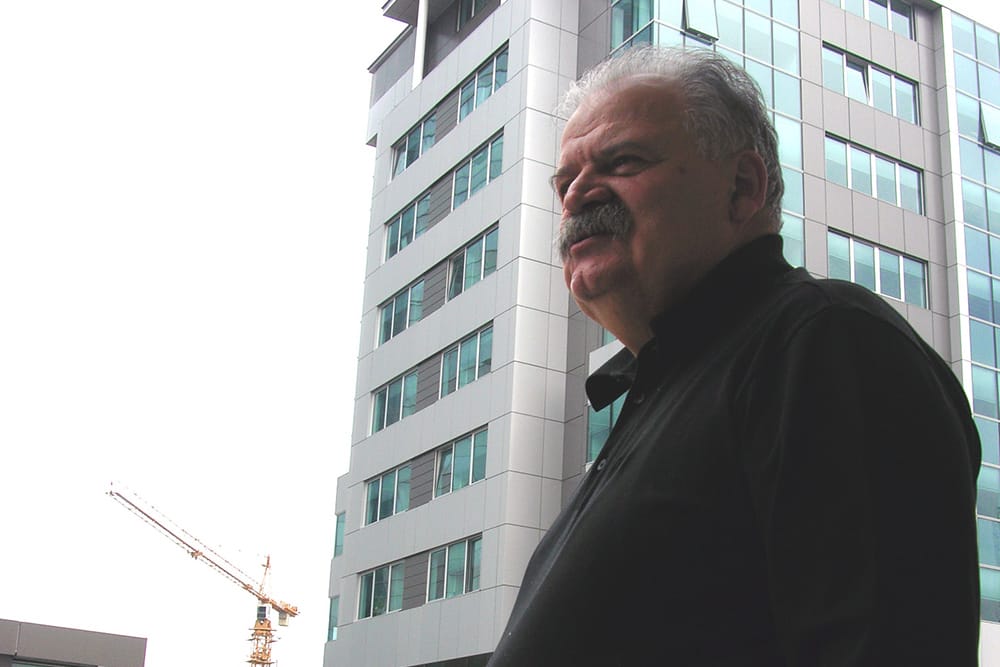Government and public companies have fueled this growth spurt. Over the past decade, despite repeated reservations about the qualifications of the company and the quality of its work, Integral has held a near monopoly on the biggest public works contracts handed out in the Republika Srpska (RS).
The court registry shows that after its first year, co-owners Miloš Crnomarković and Slobodan Stanković of Banja Luka brought in three more men, Nikola Dubravac and Dragan Bojić also from Banja Luka and Dragan Popovac from Sarajevo. The company was evenly divided.
Crnomarković said that in the early days Integral acquired most of its contracts through the Bosnian bureau for state roads under the former Yugoslavian system.
Things changed in early 1993 when Crnomarković and Popovac dropped out. Crnomarković said he didn’t want to be tagged a profiteer for working during the war and moved to Serbia.
He took two trucks, two trailers and a car, according to court records, with which he went on to form Koncis, a company in Banja Luka. Popovac cashed out his share by taking an excavator, a truck and five vehicles, plus two garages that he moved to his Laktaši company Put Inžinjering. Neither of these new companies survived.
Integral agreed, records show, to continue doing business with its ex-partners on a contract basis – which did not happen — but Integral was the sole successor to contracts for outstanding work.
Since the end of the war, and especially the installation in 1998 of Milorad Dodik as prime minister of the RS, Integral has taken off. To illustrate, in 1997, Integral was contracted for about €3.5 million worth of government work. By 2006 the figure was €110 million.
The expansion of the firm was also apparent by its acquisition, privatization and takeover of majority shares in an array of companies. ‘Trust me’ Stanković waved off a question earlier this year about how many firms he’s involved with, ‘I don’t count them anymore.’
‘We bought companies that we need’ he said. Many are in areas that supplement his main civil engineering business, but there are also spas, hotels, and textile, oil and media companies. He said he acquired spas to preserve national heritage, and media companies to give journalists better working conditions.
But Chief RS Auditor Boško Čeko said he believes the co-owner and co-founder of Integral is out of his league and receives contracts because of his connections with RS authorities. ‘My personal opinion is that this person does not have the capacity.’
Stanković admits he was never much of a student. He holds a two-year degree in construction from a Zagreb college. In Banja Luka he was a classmate in secondary school with Fatima Fetibegović, now the RS minister for Planning, Construction and Ecology. He used to copy her papers, he joked, and he said that now, of course, they are friends.
Stanković is unapologetic about the government work given to Integral. He is pumping some 60 million KM a year into the RS budget, he said, so it seems natural to him that the government is willing to create a receptive environment and support business.
He said he cooperates with all political parties, but does not fund any. The RS minister of Traffic and Communication, Nedeljko Čubrilović, supported Stanković’s assertions. He said he approached Stanković for financial help to his party, the Democratic People’s Alliance (DNS), but was rejected.
Crnomarković said his old partner gets work ‘because he does a good job or has good business connections or whatever.’ He said he can’t figure out why Stanković even wants all the contracts he gets. He is ‘just putting his health on the line for nothing’ he said.
He recalls Stanković telling him that ‘When you enter big businesses it is very difficult to get out. There’s always a loose end to be tied and then you enter the new (project) and another one comes along and so on.’
Čubrilović said Stanković ‘has a manager’s nose/hunch/feeling’ and noted that his businesses have him traveling through Slovenia, Germany and Serbia. ‘Someone who is that engaged, must have results’ the minister said.
Stanković was named Manager of the Year for 2007 by Nezavisne Novine in further a testament to his business acumen. The newspaper was a partner with Integral in its 3.8 million KM acquisition of competing Banja Luka newspaper Glas Srpske.
Integral Inženjering consists of 17 companies, according to its website. They include:
- Integral Inženjering, Laktaši
- Integral Inženjering, Belgrade
- Integral Inženjering, Podgorica
- Integra Inženjering, Banja Luka
- Civil Engineering Institute IG Banja Luka
- Vektor Integra, design and residencial construction, Sarajevo
- Fer-oill, oil distribution, Brčko
- Limestone Quarry and Plant Doboj
- Elvaco, metalworking, Bijeljina
- Unity Construction Gradiška
- Komgrap, construction, Belgrade
- Health Tourism Center Slatina
- Slateks Textile, Slatina
- Laktaši Spa Laktaši
- Economic Institute Banja Luka
- ZGOP, railway tracks, Novi Sad
- DOOEL, construction and overhaul, Skopje







